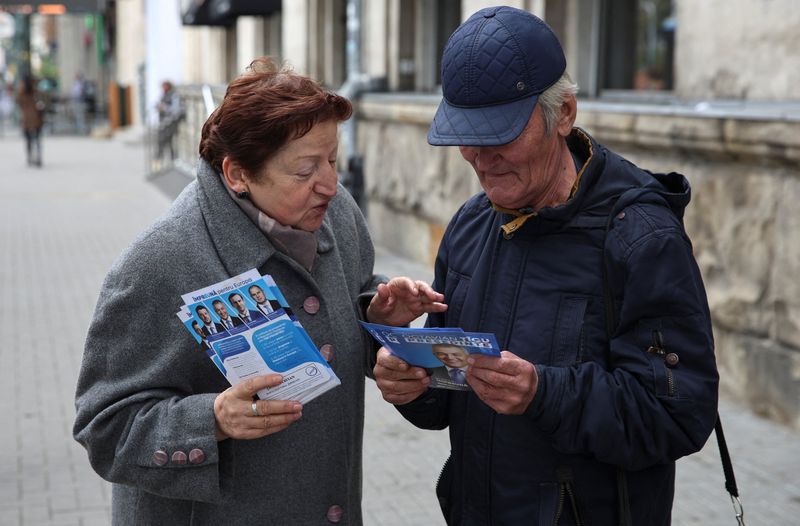By Tom Balmforth and Alexander Tanas
CHISINAU (Reuters) -Moldovan President Maia Sandu said Sunday's twin votes faced an "unprecedented" assault from outside interference after preliminary results showed the election heading for a tight run-off and an EU referendum going to the wire.
With more than 92% of the ballots counted, 52% voted "no" in the referendum with 47% Moldovans voting "yes". Despite the gap, analysts said the "yes" camp could still prevail because the largely pro-EU diaspora's ballots were yet to be counted.
Sandu meanwhile had 38% of the vote at the presidential election, while her main rival, former Prosecutor General Alexandr Stoianoglo, had 28%, setting the stage for a Nov. 3 run-off in the poor ex-Soviet southeast European nation.
The vote goes to a run-off if no candidate clears the 50% mark.
In a statement to Moldovans, Sandu said there was "clear evidence" that criminal groups working together with foreign forces hostile to Moldova's interests sought to buy off 300,000 votes, something she called "fraud of unprecedented scale."
"Their objective was to undermine a democratic process. Their intention was to spread fear and panic in society... We are waiting for the final results, and we will respond with firm decisions," she said.
The run-up to the vote was overshadowed by a slew of Moldovan allegations of election meddling by fugitive tycoon Ilan Shor who lives in Russia. Moscow has denied interfering, while Shor denies wrongdoing.
Earlier this month, Moldovan police accused Shor, who was jailed in absentia for fraud and theft, of trying to pay off a network of at least 130,000 voters to vote "no" and support "our candidate" at the elections.
Shor has openly offered on social media to pay Moldovans to convince others to vote in a certain way and said that is a legitimate use of money that he earned.
In the early hours of Monday, he said Moldovans had voted against the referendum, adding "today I congratulate you, you lost the battle", addressing Sandu simply as Maia.
Ahead of the vote, Moldovan authorities took down online resources they said hosted disinformation, announced they had uncovered a programme in Russia to train Moldovans to stage mass unrest and opened criminal cases against allies of Shor.
'IN THE GRAY ZONE'
Flanked by Romania and war-stricken Ukraine, Moldova has alternated between pro-Western and pro-Russian courses since the 1991 break-up of the Soviet Union.
Ties with Moscow have deteriorated under Sandu who has championed EU integration. Her government has condemned Russia's invasion of Ukraine, accused Russia of plotting her overthrow, and diversified energy supply after Russia reduced gas supplies. Russia has accused Sandu's government of Russophobia.
Sunday's referendum sought to decide whether to insert a clause into the constitution defining EU accession as a goal.
As the war in Ukraine has raged to the east, turning the political and diplomatic spotlight on Moldova, it has accelerated its push to escape Moscow's orbit and embarked on the long process of EU accession talks.
A "no" vote would not be legally binding, but would energise Stoianoglo's campaign and would be a blow to Sandu. The pro-Western incumbent wants Moldova to join the EU by 2030.
Polls had showed a clear majority of Moldovans supporting accession to the European Union ahead of the vote.
At least five of the candidates told their supporters to either boycott the referendum or vote "no", arguing the referendum was a ruse to boost Sandu's haul at the election.
Stoianoglo, whose candidacy was backed by the traditionally pro-Moscow Party of Socialists, boycotted the referendum as he voted, saying the country needed a new government and that if he won, he would develop ties with the EU, Russia, U.S. and China.
Oazu Nantoi, a lawmaker for Sandu's PAS party, put the weaker-than-expected result down to what he said was Russian "hybrid" interference.
"We are in the gray zone and under great influence of Putin," he said.
META: is this perennial leader facing new challenges?
With valuations skyrocketing in 2024, many investors are uneasy putting more money into stocks. Sure, there are always opportunities in the stock market – but finding them feels more difficult now than a year ago. Unsure where to invest next? One of the best ways to discover new high-potential opportunities is to look at the top performing portfolios this year. ProPicks AI offers 6 model portfolios from Investing.com which identify the best stocks for investors to buy right now. For example, ProPicks AI found 9 overlooked stocks that jumped over 25% this year alone. The new stocks that made the monthly cut could yield enormous returns in the coming years. Is META one of them?
Unlock ProPicks AI to find out
